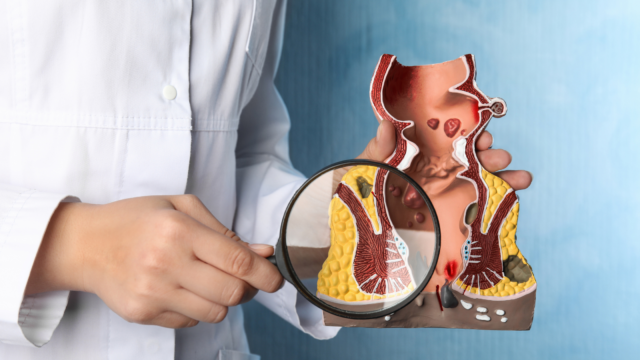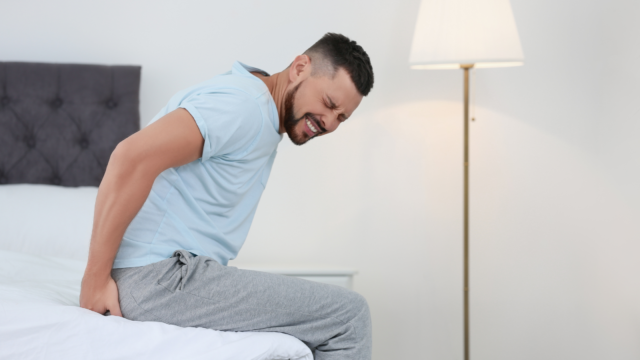Hemorrhoids, a prevalent but often misunderstood condition, merit a comprehensive exploration to provide a thorough understanding. This guide aims to delve deeply into the intricacies of hemorrhoids, addressing fundamental questions and offering extensive insights for those seeking a more in-depth comprehension.
1. What are Hemorrhoids?
Hemorrhoids, or piles, are vascular structures located in the anal canal. They play a role in controlling stool, but when swollen or inflamed, they can lead to discomfort and bleeding. Hemorrhoids are broadly classified into internal (inside the rectum) and external (under the skin around the anus). Understanding the anatomy is crucial to appreciating the impact on daily life.

2. What Causes Hemorrhoids?
Several factors contribute to the development of hemorrhoids, often stemming from increased pressure on the pelvic region. Key contributors include:
- Straining During Bowel Movements:
One of the primary contributors to hemorrhoids is the strain experienced during bowel movements, especially in cases of constipation or diarrhea. Statistics indicate that approximately 50% of individuals over the age of 50 in the United States experience symptoms related to hemorrhoids at some point in their lives. The force exerted during strained bowel movements can cause the veins in the rectal area to swell and become susceptible to hemorrhoidal development.
- Obesity:
Excess weight places a substantial burden on the pelvic veins, potentially leading to the swelling of hemorrhoidal cushions. Studies have shown that individuals with obesity are more prone to developing hemorrhoids, with the risk increasing as body mass index (BMI) rises. The added pressure on the pelvic blood vessels can contribute to the formation and exacerbation of hemorrhoids, creating a significant correlation between obesity and this common rectal condition.
- Pregnancy:
Pregnancy introduces a unique set of factors that can contribute to the formation of hemorrhoids. As the uterus expands to accommodate the growing fetus, it exerts pressure on the pelvic blood vessels, particularly the vena cava. This compression increases the pressure in the lower rectal area, making pregnant women more susceptible to hemorrhoids. Statistics reveal that nearly 50% of pregnant women experience hemorrhoids, often during the later stages of pregnancy. Additionally, hormonal changes during pregnancy can affect the vein walls, further contributing to hemorrhoidal development.
- Sedentary Lifestyle:
A sedentary lifestyle, characterized by a lack of physical activity, is a recognized risk factor for hemorrhoids. Individuals who engage in prolonged periods of sitting or lead a predominantly inactive lifestyle may experience disruptions in regular bowel function. Research suggests that sedentary behavior is associated with an increased risk of developing hemorrhoids, emphasizing the importance of physical activity in maintaining optimal gastrointestinal health.
Understanding these contributing factors sheds light on the multifaceted nature of hemorrhoid development. By addressing these underlying causes, individuals can take proactive measures to mitigate the risk and enhance overall rectal health.
3. Can Hemorrhoids be Treated at Home?
While certain cases may necessitate medical intervention, many individuals find effective relief and management of hemorrhoids through accessible and practical home-based strategies. Focusing on a combination of ointments, water baths, mindful toilet habits, and avoiding excessive straining during bowel movements can significantly contribute to alleviating symptoms associated with hemorrhoids.
A. Ointments and Topical Treatments:
Over-the-counter creams and ointments designed specifically for hemorrhoid relief can provide targeted symptom relief. These topical treatments often contain soothing agents such as witch hazel or aloe vera, aiming to reduce inflammation, alleviate itching, and promote overall comfort.
- Witch Hazel: Derived from the witch hazel shrub, witch hazel has a long history of use for its anti-inflammatory properties. Applying witch hazel topically may help reduce swelling and discomfort associated with hemorrhoids.
- Aloe Vera: Known for its soothing properties, aloe vera gel can be applied topically to alleviate irritation and provide relief from itching.
B. Water Baths (Sitz Baths):
Warm water baths, commonly known as sitz baths, are a widely recommended home remedy for hemorrhoids. This involves sitting in a few inches of warm water for about 15 minutes, several times a day. Sitz baths can help soothe the affected area, reduce inflammation, and promote overall comfort.
- Epsom Salt Addition: Adding Epsom salt to the warm water can enhance the soothing effect of sitz baths. Epsom salt has been traditionally used for its anti-inflammatory properties and can contribute to relaxation.
C. Mindful Toilet Habits:
Adopting mindful toilet habits can play a crucial role in preventing further irritation and promoting healing.
- Limited Time on the Toilet: Avoid sitting on the toilet for prolonged periods, as this can contribute to increased pressure on the rectal area. Limit bathroom time to no more than 10 minutes.
- Avoid Excessive Straining: Refrain from excessive straining during bowel movements. Straining can exacerbate hemorrhoidal symptoms and potentially lead to increased irritation.
D. Healthy Lifestyle Practices:
In addition to specific treatments, cultivating a healthy lifestyle can complement home-based strategies for managing hemorrhoids.
- Dietary Fiber: Maintain a diet rich in fiber to promote regular bowel movements and prevent constipation. Fiber can be obtained from fruits, vegetables, whole grains, and legumes.
- Hydration: Ensure adequate fluid intake to maintain soft stools and reduce the likelihood of straining during bowel movements.
- Regular Exercise: Engage in regular physical activity to promote overall digestive health and prevent sedentary-related complications.
- Herbal Teas: Infusions with natural ingredients like chamomile or peppermint can also contribute to hydration while providing additional soothing properties to the digestive tract.
While these home-based strategies can offer relief for mild to moderate cases of hemorrhoids, it’s essential to monitor symptoms closely. If symptoms persist, worsen, or if there is any concern, seeking professional medical advice is crucial for accurate diagnosis and appropriate intervention. Always consult with healthcare professionals for personalized guidance based on individual health conditions.
4. Can Hemorrhoids Go Away on Their Own?
The natural course of hemorrhoids varies among individuals, and in some cases, they may resolve on their own without the need for specific medical interventions. Factors influencing their resolution include:
- Healthy Habits:
- A well-balanced diet rich in fiber.
- Regular physical activity.
- Maintaining a healthy weight.
- Hygiene Practices:
- Proper anal hygiene to prevent irritation.
- Warm sitz baths for soothing relief.
- Holistic Approaches:
- Herbal remedies such as witch hazel or aloe vera.
- Psyllium husk supplementation for softer stools.
While adopting these measures can contribute to the natural resolution of mild cases, it’s important to note that severe or persistent hemorrhoids may require medical intervention for effective management and relief.
5. When Should I See a Doctor for Hemorrhoids?

While many cases of hemorrhoids can be effectively managed with conservative measures and lifestyle changes, there are situations where surgical intervention may be recommended. Surgical options are typically considered when home remedies and non-invasive treatments fail to provide adequate relief or when hemorrhoids reach an advanced stage. Here are scenarios where surgery may be considered:
- Thrombosed Hemorrhoids:
Thrombosed hemorrhoids occur when blood clots form within the swollen veins, causing significant pain and swelling. If a thrombosed hemorrhoid does not respond to conservative treatments or causes severe discomfort, a surgical procedure known as hemorrhoidectomy may be recommended.
- Prolapsed Hemorrhoids:
When internal hemorrhoids prolapse (extend outside the anal opening) and cannot be effectively treated with non-surgical methods, surgery may be considered. Procedures such as hemorrhoidectomy or stapled hemorrhoidopexy may be recommended to address prolapsed internal hemorrhoids.
- Chronic or Severe Bleeding:
Persistent or severe bleeding from hemorrhoids may necessitate further evaluation and intervention. If conservative measures fail to control bleeding, surgical procedures like rubber band ligation, sclerotherapy, or hemorrhoidectomy may be considered.
- Multiple or Recurrent Hemorrhoids:
If an individual has multiple hemorrhoids or experiences recurrent episodes despite conservative treatments, surgery might be explored as a more definitive solution. Procedures like hemorrhoidectomy or stapled hemorrhoidopexy aim to remove or address multiple hemorrhoids simultaneously.
- Complications such as Strangulation:
In rare cases, hemorrhoids may become “strangulated,” meaning the blood supply to the hemorrhoid is restricted. This can lead to severe pain and tissue damage. Emergency surgical intervention may be required to address strangulated hemorrhoids and prevent further complications.
- When Conservative Measures Fail:
If symptoms persist despite diligent adherence to conservative measures, and the quality of life is significantly impacted, surgical options may be discussed with a healthcare professional.
- Considerations for Surgery:
Before recommending surgery, healthcare professionals will carefully assess the severity of symptoms, the impact on daily life, and the overall health of the individual. The decision to undergo surgery is often a collaborative one between the patient and their healthcare provider.
READ: When Should I Consider Surgery for Hemorrhoids?
In conclusion, a nuanced understanding of hemorrhoids involves recognizing the interplay of lifestyle, anatomy, and medical considerations. By adopting a holistic approach to prevention and management, individuals can empower themselves with knowledge for improved digestive health. Always consult with a healthcare professional for personalized advice tailored to individual circumstances.


